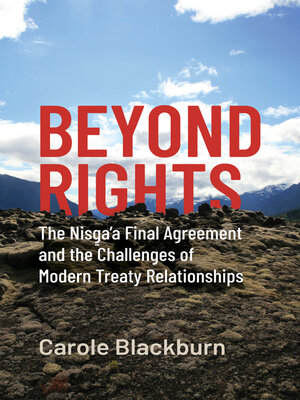Beyond Rights
ebook ∣ The Nisg̱a'a Final Agreement and the Challenges of Modern Treaty Relationships
By Carole Blackburn

Sign up to save your library
With an OverDrive account, you can save your favorite libraries for at-a-glance information about availability. Find out more about OverDrive accounts.
Find this title in Libby, the library reading app by OverDrive.



Search for a digital library with this title
Title found at these libraries:
| Library Name | Distance |
|---|---|
| Loading... |
In 2000, the Nisg̱a'a treaty marked the culmination of over one hundred years of Nisg̱a'a people protesting, petitioning, litigating, and negotiating for recognition of their rights and land title. Beyond Rights explores this groundbreaking achievement and its impact.
Treaty making has long been an important element in relationships between the Crown and Indigenous peoples in what is now Canada, but modern treaties are more complex and multifaceted. Embodying the force of law, they are social and political compacts intended to create lasting reciprocal relationships between treaty partners. The Nisg̱a'a were trailblazers in gaining Supreme Court recognition of unextinguished Aboriginal title, and the treaty marked a turning point in the relationship between First Nations and provincial and federal governments. By embedding three key elements – self-government, title, and control of citizenship – the Nisg̱a'a treaty tackled fundamental issues concerning state sovereignty, the underlying title of the Crown, and the distribution of rights.
Using this pivotal case study, Beyond Rights analyzes both the potential and the limits of treaty making as a way to address historical injustice and achieve contemporary legal recognition. It also assesses the possibilities for a distinct Indigenous citizenship in a settler state with a long history of exclusion and assimilation.







